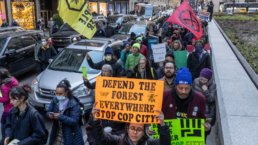In an 11th-hour change, Atlanta approved new rules for citizen-led petitions to include signature matching—a practice decried by Cop City protesters and voting rights advocates.
by Piper French, Bolts
On January 29, two activists locked themselves to construction equipment belonging to the main “Cop City” contractor, shutting down the work site in downtown Atlanta for hours. “Myself and countless other residents have tried every legal avenue to Stop Cop City—but the City government has stonewalled us every step of the way,” an activist called Temperance said in a press statement. “I don’t want to have to be doing this today, but direct action and civil disobedience are the only options we have left.” Both activists were arrested and jailed.
In a way, the movement was returning to its roots. In 2021, the fight to stop Cop City began with direct action. After two years of protest, organizers extended their effort to the ballot box. Some felt it was critical to let Atlantans weigh in directly on the construction of a vast new law enforcement training center—and they were betting that the will of the people would ultimately come down on their side. On a more practical level, a referendum campaign struck Mary Hooks, a lead organizer for the Cop City vote coalition, as a straightforward process with delineated steps and rules: a signature collection phase, a break while the city verified them, then on to a massive voter turnout effort. “We were like, ‘This seems very clear in terms of the path that we need to be walking on,’” she recalled.

As it turns out, the path has been anything but clear. The Atlanta city government has thrown up barriers at every turn, miring the petition gathering and signature approval process in bureaucratic and legal delays. The city has even drawn the ire of mainstream Democratic politicians and voting rights groups in its attempts to deploy classic forms of voter restriction.
These roadblocks were made possible by the fact that the organizers are essentially starting from zero. Atlanta has never hosted a citizen-led referendum before, and therefore has few established structures in place to govern the process. “So much of what happened over the course of the past two years was entirely preventable, had we had a codified process that allowed everyone to know what the rules of the game were,” said Rohit Malhotra, the founder and executive director of Atlanta’s Center for Civic Innovation.
Recent Posts
How to Organize Safely in the Age of Surveillance
February 22, 2026
Take Action Now From threat modeling to encrypted collaboration apps, we’ve collected experts’ tips and tools for safely and effectively building a…
‘The Siege Must Be Broken’: Countries Called to Ship Fuel to Cuba After Trump Tariffs Struck Down
February 21, 2026
Take Action Now The US Supreme Court’s ruling “implies that Trump’s recent order imposing tariffs on countries selling oil to Cuba exceeds the…
Elite Depravity in Imperial Decline, A Zero Hour Conversation With Richard Wolff
February 20, 2026
Take Action Now “The system self-selects for psychopathy… the most sociopathically obsessive competitor and accumulator of personal power and…
Economics of Health For All: The Plan to Put Health at the Heart of the Global Economy
February 20, 2026
Take Action Now At the World Health Assembly in May, member states may endorse an unprecedented strategy declaring that health is not a cost – but…




